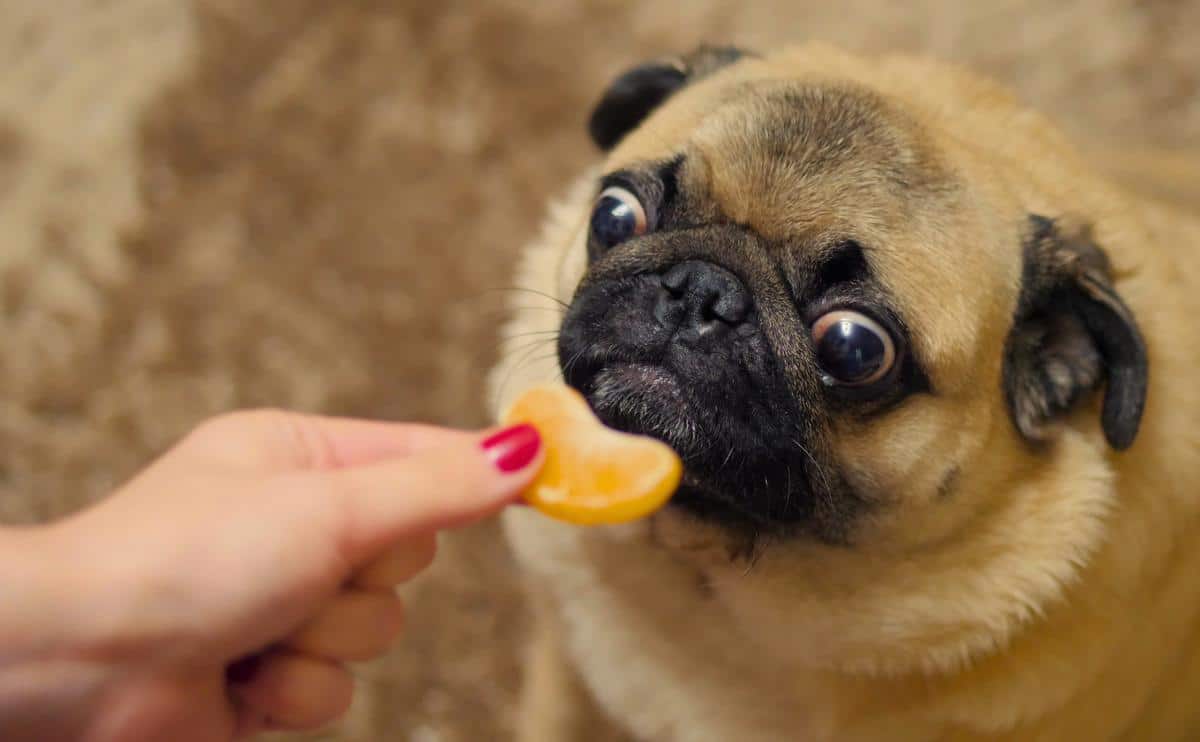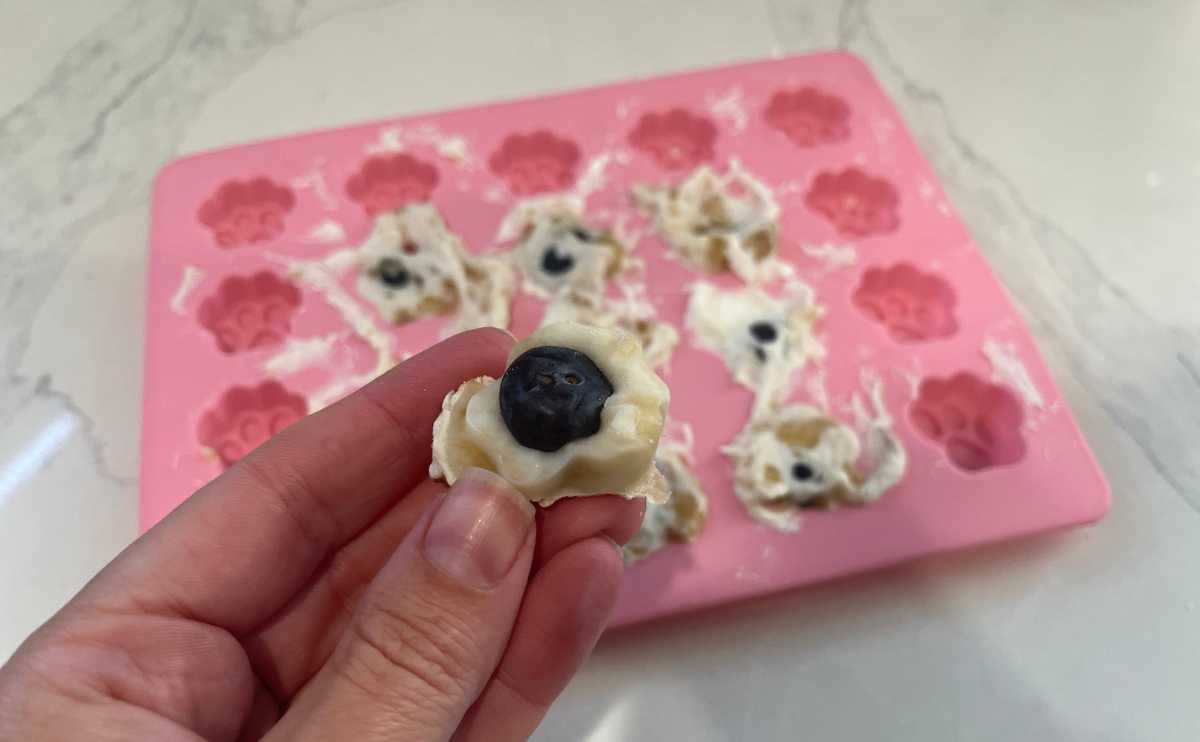Can Dogs Eat Oranges? Are They Good For Your Pup?
When you purchase through links on our site, we may earn a commission. Here’s how it works.

Oranges are a delicious, juicy fruit heavily used in our culinary dishes. Who doesn’t like to start the day with a glass of that fresh, sweet, energy-boosting nectar called orange juice? We love our oranges, fresh slices, juices, salad dressings, sauces, and even orange-flavored candy. It might seem natural to want to share this goodness with our pups but can dogs eat oranges? Are oranges safe for dogs? There is much more to know about feeding our pups fresh fruits and vegetables. Let’s get into it and learn more about dogs eating oranges.
Table of Contents
Can Dogs Eat Oranges?
Yes, dogs can eat oranges but only in minimal amounts. This fruit is not toxic to canines. Cats, conversely, have difficulty with citric acid and should never be fed citrus fruit. Even though a small amount of an orange can be a juicy, tangy treat, dogs should not eat large amounts of citrus fruit.
One of the biggest concerns with citrus fruits is that they are very high in sugar. While this is natural sugar and part of what makes oranges so tasty, canines should not eat large amounts of foods with elevated sugar content.
The higher sugar content can lead to weight gain and increase the risk of developing diabetes. High-sugar foods are very harmful to canines that suffer from diabetes. Additionally, orange seeds can be a hazard and contain trace amounts of cyanide. Citrus is highly acidic, which can cause gastrointestinal upset and digestive troubles. These can include stomach pain, diarrhea, and vomiting.
What Are Oranges?
Oranges, known by the scientific name Citrus sinensis (sweet orange), grow on trees and originated in ancient times. The trees are native to the Himalayan foothills in an area that covers India, modern-day southeast China, and northern Myanmar. They are believed to be a hybrid between two other citrus fruits, the pomelo and an earlier relative of the mandarin fruit.
Today the orange tree is one of, if not the most highly cultivated trees, in the entire world. In the United States, we often think of oranges as native to the state of Florida. However, they are not. Spanish colonists brought the Citrus sinensis tree into the area in the early 1900s. Other words for the fruit include naranja, simple fruit, clementine (though these are different fruits), and cara cara. In different regions of the world and in various languages, there are many other terms to describe this tasty fruit.
The fruit we humans love so much is the sweet orange, including clementines and blood oranges, but there are other varieties. These include the more bitter wild species, Citrus aurantium. This fruit is far more bitter and not palatable for humans.
Are Oranges Good For Dogs?
Citrus does have some nutritional benefits for canines. Keep in mind that any kind of treat, be it fresh fruit and veggies or commercially made treats, should only make up 10% of a dog’s daily diet.
- Oranges contain a healthy amount of natural fiber, which aids in digestion, regulates bowel movements, and supports health. Fiber can also help reduce inflammation in the digestive tract. Fiber also helps keep canines feeling full for a more extended period of time.
- Along with fiber, these contain potassium, a mineral that is pivotal in the function of the kidneys and works to help with muscle, heart, and digestive processes.
- Oranges are well known for their high levels of vitamin C. Canines make enough vitamin C on their own and generally do not need it in their diet, but small amounts of foods like this can offer an antioxidant boost and help support the immune system function.
- Citrus fruits are low in calories and sodium, making them a much healthier snack than processed foods or human treats.
Dog owners must always stick to freshly prepared, plain fruits when giving them to pets. Do not give them fruit that has been soaked in syrup or added sugars and other ingredients. Freshly peeled fruit is always best. Do not give pets orange juice, as it’s far too high in sugar.
Can Dogs Eat Orange Peels?
Canines should not eat orange peels. Though they are non-toxic and contain no poison or risk that way, dogs don’t digest orange peels well. They can become stuck in your dog’s throat and digestive system. This can lead to choking or obstruction in the digestive tract. Bowel obstruction is a very serious situation and most often requires surgery to correct it. Make sure to always keep all orange peels out of your dog’s reach.
What About The Seeds?
The same advice goes for the seeds. Seeds contain very small amounts of cyanide, and while one or two at a time is not a risk, a large amount could become problematic. The danger is not only because of the cyanide content but also because they are hard to digest and can potentially cause blockages in the intestines and digestive tract. For this reason, it is best to de-seed any kind of citrus you give your pup.
Can Dogs Eat Orange Slices?
Yes, dogs can eat orange slices. The amount will depend upon the size of the dog, the variety of fruit, and the size of the segments. When first introducing a canine to these, it is best to start with one slice or segment or even half of one. Observe your pup after eating to ensure there are no allergic or unpleasant reactions.
Once you have established this is a safe food for your dog, you can offer them between one and three slices at a time, depending on the size. Larger pups may even be able to consume about half an orange if it is smaller in size. Of course, they should not eat orange slices every day. This should be a very occasional treat.
Can Dogs Eat Mandarin Oranges?
Yes, dogs can eat mandarins. Just like other citrus varieties, these fruits are not toxic and offer some health benefits and an intriguing taste. Because mandarins are small, allowing your dog to overindulge can be easy. Stick to a few segments for smaller pups and, at most, one mandarin for a large to giant breed.
It is essential to point out that only fresh fruits should be fed to a canine. Stay away from any canned or jarred variety of mandarins. These are often soaked in highly sugared syrups or juices and may have added sweeteners like xylitol, which is highly toxic to canines.
Mandarins are often referred to as oranges but are not the same citrus species. There are several types of mandarins as well. However, mandarins are safe and non-toxic for canines. The same guidance about seeds, peels, and limited serving applies to these as any other citrus variety.
Can Dogs Eat Cuties Oranges?
Yes, they can. Cuties are a tasty, sweet treat beloved by kiddos across the country and are not toxic to canines. Cuties are an intentional hybrid between mandarins and sweet oranges. They are engineered to be easy to peel and very sweet. Many are also seedless. As with other citrus varieties, they are safe in minimal quantities. Stick with a few pieces, and only feed these to your pup on occasion.
While this food is safe for your pup in small servings, not every food or fruit is okay. Also hazardous are many inedible items and dangerous chemicals they come across every day. Simply eating a stick in the yard could cause problems. Your pup is sure to encounter unexpected dangers and health concerns as they age. Pet insurance can decrease financial worry so you can focus on your dog’s health and recovery should an emergency arise.
Unsafe Fruits For Dogs
It is crucial to exercise caution when feeding your dog fresh fruits and vegetables because not all fruits are suitable for canine consumption. Though many are healthy snacks for humans, some fruits can be very dangerous for canines. One of the most hazardous is grapes. Grapes and their dried variety, raisins, are prevalent as a household food but can cause very severe kidney damage and even lead to kidney failure. Avoid grapes anywhere near your pup’s bowl, and be very careful to pick up any that get dropped on the floor. Even one grape is a risk.
Be aware that any fruit containing a pit or seed poses a potential choking hazard. The risk is especially true for fruits like peaches and cherries. Both fruits’ flesh is safe for canine consumption, but the pits contain cyanide and are a choking hazard.
Avocados are another fruit that canine owners should avoid feeding to their pets. Avocados contain a fatty acid called persin. In larger quantities, persin is toxic to canines. So, as tasty as that guacamole may be on your taco, it’s not a good addition to your pet’s bowl.
Looking For Other Dog Treat Ideas?
Canines should consistently be fed a high-quality diet appropriate for their life stage and medical needs. Most pups enjoy a mix of crunchy kibble and tasty wet food. Of course, each dog is an individual and will have unique dietary needs, such as diabetes or being overweight. Adding treats to the mix offers variety and extra flavor and is a fantastic training and behavior reward.
There are plenty of commercial doggie treats to choose from, as well as homemade treats owners can try. Owners can pick from vegan dog treats, freeze-dried meat, low-calorie treats, frozen treats for a balmy day, and even treats for diabetic pups or those that suffer from skin allergies. CBD treats can help with inflammation, pain, and mood.
Always discuss any specific concerns about your pet’s health with your veterinarian. This is an important first step before adding any kind of fresh fruits, treats, or supplements. Especially if your pup has any other medical concerns or issues, always discuss any type of dietary change first.



